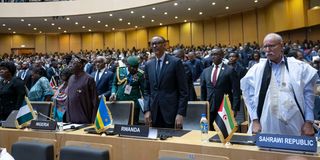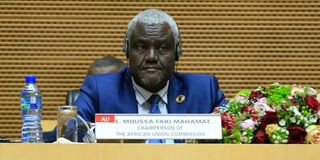AU Summit drama raises questions on whether bloc is reforming

Heads of State during the Opening Ceremony of the 37th Ordinary Session of the African Union Assembly in Addis Ababa on February 17, 2024.
What you need to know:
- A mini-summit was convened on the escalating conflict in Eastern Democratic Republic of Congo (DRC).
- Another dramatic event involved the protocol dispute concerning the President of Somalia.
As the dust settles on the 37th Ordinary Session of the African Union (AU) Assembly, questions are emerging about the implication of the dramatic scenes witnessed during the summit on the future of the Union.
This AU summit came when its leadership and collective action of its members to address the plethora of political, socio-economic and security challenges facing Africa are in huge demand.
The opening speech of the AU Commission Chairperson, Moussa Faki Mahamat, made this clear when he rightly asked “[h]ow should we stop watching terrorism ravage some of our countries without doing anything?.”
Regrettably, the Summit did not fit the bill in terms of delving into and adopting meaningful policy actions for addressing the pressing issues of this “heroic and glorious time,” as Faki dubbed it.
However, it is not because, as one report erroneously put it, the summit ignored the ‘continent’s conflicts and political crises’.
A mini-summit was convened on the escalating conflict in Eastern Democratic Republic of Congo (DRC).
The AU ad-hoc committee of five on South Sudan held a ministerial meeting. Apart from such high-level meetings on these conflict situations on the margins of the summit, the AU Assembly received a report on Libya and deliberated on all these and a range of other conflict situations as part of its consideration of the Report of the Peace and Security Council.
Rather than lack of attention, what this summit could be faulted for is the inability of the conveners and participants of the summit to marshal consensus and adopt concrete measures for at least mitigating, if not effectively managing, the escalating tensions, crises and conflicts. Considering the global policy process for reform of the multilateral system, particularly within the framework of the Summit of the Future which is of strategic interest for Africa, this summit was also a missed opportunity for outlining an African common position as we argued here.
Beyond failing to deliver on the pressing issues facing the continent, as some including delegations of member states observed, this year’s summit was filled with dramatic events that highlighted lack of decorum, dwindling regard for AU processes and lack of amity between governments of some countries.
During the opening session of the heads of state and government meeting, about a dozen people staged a protest on the conflict in Eastern DRC from the press and observer gallery of Mandela Hall.

African Union Commission (AUC) Chairperson, Moussa Faki Mahamat attends the 35th African Union (AU) Summit in Addis Ababa, Ethiopia on February 6, 2022.
Before the start of the main summit, a mini-summit bringing together key regional states was held on the escalating conflict in Eastern DRC.
Rather than serving as a platform for bridging the divide between the two countries, the mini-summit became a site for trading of accusations between the two countries. Worryingly, the bitter exchanges the leaders of the two countries might have hardened their positions, hence worsening the situation further.
Another dramatic event involved the protocol dispute concerning the President of Somalia.
Apart from the bitter exchanges that were on display both in the closed-closed segment of the summit and persisted during the main summit, President Hassan Sheikh Mohamud of Somalia insinuated that Ethiopian authorities tried to sabotage his participation.
Rather than the use of institutional and diplomatic channels of the AU, the President convened a press conference, hence opting for litigating the matter in the court of public opinion, although it is doubtful if this approach earned the sympathy and support of the wider AU membership.
In respect of both the escalating tension between DRC and Rwanda and that of Somalia and Ethiopia, what is problematic is not simply the resort to grandstanding and its deleterious consequences on AU diplomacy.
No less damaging is the failure of the conveners and the wider AU membership to prevail over the representatives of these countries and provide leadership for helping establish appropriate channels and mechanisms, at least, for helping ease the escalating tensions.
No less dramatic was the AU Commission Chairperson’s observation that the ‘rampant tendency to make decisions without real political will to apply them has grown to such an extent that it has become devastating to our individual and collective credibility,’ noting that 93 per cent of the decisions adopted during the past three years have not been implemented.
As a statement of one delegation delivered during the summit that we have seen rightly pointed out, this implementation deficit is also due to ‘the continued proliferation of decisions, emanating from the plethora of items on the Assembly’s agenda,’ contrary to the aim of the AU reform to focus on strategic priorities of continental scope by rationalizing the agenda of the summit, addressing the decision-to-implementation gap and streamlining the working methods.
There is no single actor to blame for those wondering if this is an institution deforming or reforming. All those with direct role in agenda-setting and decision-making on the part of the AU Commission, organs and member states bear responsibility.
It is incumbent on each of them to assume their respective responsibilities for restoring decorum and spirit of cooperation.
A corollary to this is also reversing the underlying crises of ideas and leadership that Faki aptly described in terms of ‘a real decline in the beautiful spirit of African solidarity and Pan-Africanism, the soul of our renaissance.’
Tefesehet is a Researcher, Tsion Hagos Programme Director and Solomon Dersso is Founding Director, Amani Africa.





